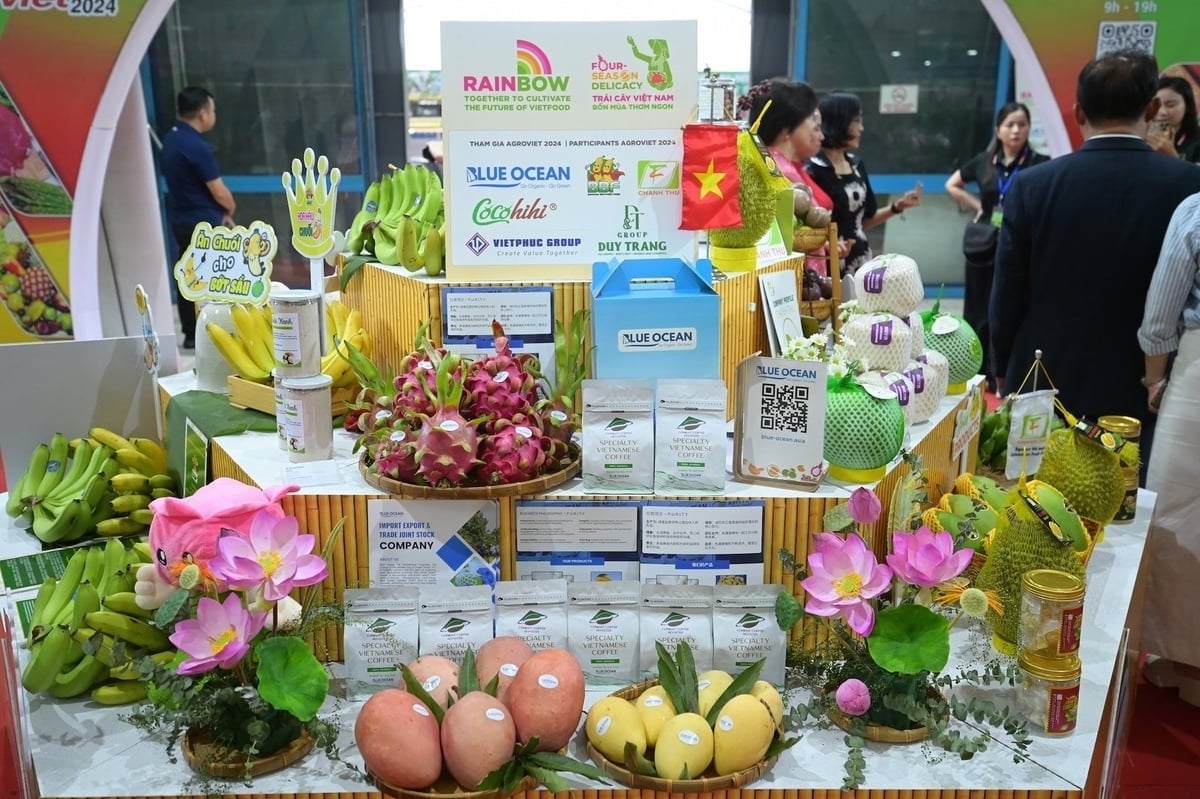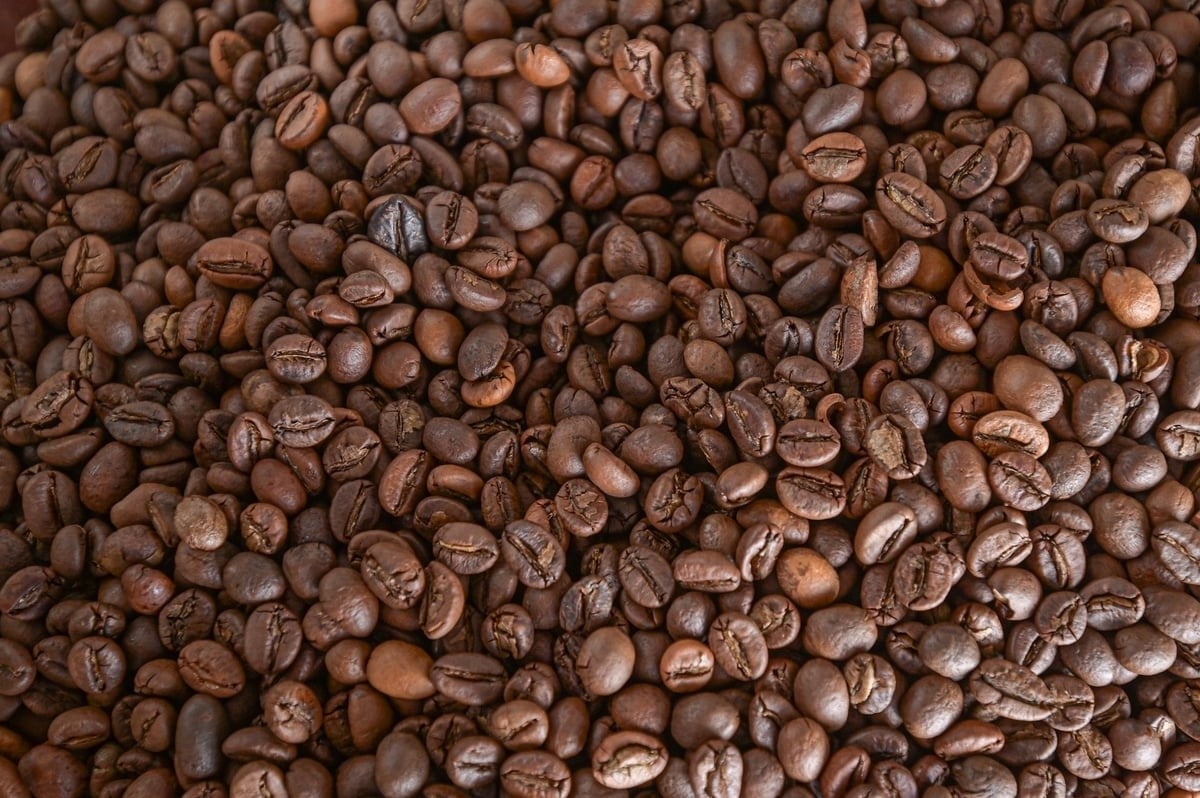November 24, 2025 | 14:26 GMT +7
November 24, 2025 | 14:26 GMT +7
Hotline: 0913.378.918
November 24, 2025 | 14:26 GMT +7
Hotline: 0913.378.918

In recent years, the export of agricultural products has generated significant value. Photo: Tung Dinh.
On May 8, 2025, Prime Minister Pham Minh Chinh signed Official Telegram No. 59/CD-TTg, requiring Ministries and localities to focus on ensuring stable production, consumption, and export of agricultural, forestry, and fishery products amid global trade volatility.
According to the official telegram, Vietnam's agro-forestry-fishery production, particularly food production, has remained stable and achieved good growth over the years, with each successive year surpassing the last. In 2024, agro-forestry-fishery export value reached a record high of USD 62.5 billion.
However, recently, especially in the near future, global trade may experience strong fluctuations due to changes in tariff policies in several countries, posing risks to impact production and exports in general, particularly of agricultural, forestry, and fishery products.
At the same time, this also presents an opportunity for industries, localities, enterprises, and farmers to accelerate transformation and diversification in products and markets, moving toward sustainable production.
In response, the Vietnamese PM has requested relevant Ministries, branches, and localities to closely monitor global trade developments, proactively direct, and timely and flexibly implement appropriate and effective solutions to mitigate challenges arising from trade instability.
Timely information must be provided to agro-forestry-fishery producers, traders, and exporters. This will enable them to adapt flexibly and efficiently to importers' import and tariff policies, thereby stabilizing production and exports of agricultural, forestry, and fishery products.
Specifically, the PM has tasked the Minister of Agriculture and Environment (MAE) with continuing to direct localities to enhance agricultural production, especially food, to ensure a sufficient domestic supply and support exports, while safeguarding national food security under all circumstances.
In addition, the MAE must proactively coordinate with relevant Ministries, branches, and localities to propose appropriate measures to sustain the production and consumption of agricultural, forestry, and fishery products, avoiding supply chain disruptions that could affect production and people's livelihoods.
Efforts must focus on restructuring the agricultural sector toward large-scale commercial production and promoting green, organic, circular, and sustainable agriculture. Implementation of the "Sustainable Development of One Million Hectares of High Quality and Low-Emission Rice Associated with Green Growth in the Mekong River Delta" Project must continue effectively through 2030.
The MAE should coordinate with industry associations, businesses, and localities to review planning and production strategies for product and market diversification, ensuring flexible adaptability to new market fluctuations and demands. Strengthening the development of geographical indications, product branding, planting and farming area code issuance, and strict traceability systems to combat commercial fraud, especially in industries at high risk of origin evasion, is also essential.
The PM has also assigned the MAE to intensify research and application of science, technology, innovation, and digital transformation in agriculture. At the same time, focus on researching and introducing new crop and livestock varieties that are high-yielding, of superior quality, and resilient to climate change.
Priority should be given to research, application, and technical support for preservation and deep processing technologies, especially for high-value products such as shrimp, pangasius, and fresh fruit, to shift from raw exports to refined and canned goods. This transition targets both export and domestic consumption while boosting the value-added of Vietnamese agricultural products.
In coordination with the Ministry of Finance and other relevant agencies, the MAE must proactively study plans for supporting the procurement and temporary stockpiling of some commodities, particularly rice, coffee, and pepper, that are at risk of price declines during peak harvest time, thereby limiting the impact on farmers' income.

The Prime Minister requested relevant agencies to consider the plan of procurement and temporary stockpiling of agricultural products that face the risk of price decline during peak harvest season. Photo: Tung Dinh.
For the Ministry of Industry and Trade, the PM assigned the Minister to take the lead and coordinate with the MAE and the Ministry of Foreign Affairs to enhance trade promotion and engage in negotiations with potential countries. The aim is to expand further and diversify export markets, preeminent partners with which Vietnam has signed free trade agreements (FTAs), as well as diversify products and supply chains. At the same time, market-connection programs should be implemented, and agricultural weeks and Vietnamese goods fairs should be organized to tap into both domestic and international market potential. Appropriate trade defense measures should proactively be taken to protect domestic production.
The Ministry of Finance is to continue directing the resolution of bottlenecks, reform administrative procedures, simplify customs clearance processes for imports and exports, shorten the VAT refund timeline, and implement policies on tax and land rental fee deferral or refund as prescribed by law. The aim is to help reduce compliance costs and enhance the competitiveness of Vietnamese agricultural products.
In addition, the Ministry is to lead and coordinate with the MAE and other relevant agencies to research and propose suitable tax policies, especially for agro-forestry-fishery goods affected by trade instability, to support enterprises in finding alternative markets.
The State Bank of Vietnam is tasked with maintaining and considering the expansion of preferential credit packages for the agro-forestry-fishery sector. It should continue facilitating loans to support enterprises in sustaining production, thereby securing jobs, livelihoods, income, and living conditions for workers.
Strictly handle cases causing market instability
The PM requested that the Chairmen of People's Committees of provinces and municipal cities closely monitor developments and proactively implement solutions to ensure the production and consumption of agricultural, forestry, and fishery products in the area.
Local authorities are to strengthen inspection and enforcement efforts against fraud, counterfeit origin labeling, and the circulation of fake or substandard goods. They must closely manage the use of additives and post-harvest preservatives in agricultural products and take action to eliminate harmful chemicals that jeopardize consumer health and affect the reputation and quality of Vietnamese agricultural goods.
Cases related to origin fraud, price squeezing, market misinformation, or manipulation that destabilize the market must be strictly handled. Local governments are also responsible for ensuring food safety, environmental hygiene, and security in their jurisdictions.
Translated by Thu Huyen

(VAN) Viet Nam is entering the pivotal period of 2025-2030, moving toward the formulation of the Remote Sensing Law, which will establish a legal foundation for the development of national digital data.

(VAN) The agricultural sector is finalizing the strategic framework for emission reduction, setting the goal of sharply cutting methane and 403.7 million tons of CO2 equivalent and moving toward Net Zero by 2050.
/2025/11/22/2236-1-153832_483.jpg)
(VAN) The National Marine Spatial Planning is opening up opportunities for sustainable blue sea development across 21 coastal localities.

(VAN) Viet Nam’s forestry sector is undergoing a comprehensive transformation, strengthening management, protection, and development efforts to maintain ecological security and drive green, sustainable growth.

(VAN) Viet Nam is accelerating efforts to digitize reservoir operations, from real-time data to hydraulic modelling.
/2025/11/21/3348-2-102623_454.jpg)
(VAN) National Assembly delegate Nguyen Thi Lan has proposed adding special mechanisms to attract human resources to the agricultural, forestry, and fishery sectors, addressing the shortage of high-quality personnel.

(VAN) Over the past two decades, the unified legal framework for water resource management has been perfected, becoming a crucial foundation for ensuring national water security.